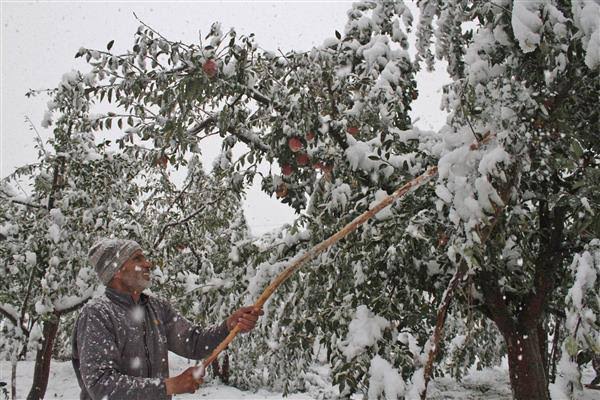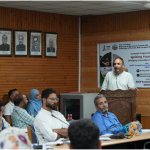Srinagar, Jan 27: Amid severe cold, the agro field unit Srinagar, agro unit SKUAST-K and Indian Meteorological Department (IMD) has issued advisory urging farmers to take precautionary measures.
For poultry farmers, the advisory issued on Monday suggested that due care is required with respect to the maintenance of brooding temperature inside the sheds.
“During the first week of rearing, temperature must be ensured and thereafter, it should be decreased every week. However, the ventilation shouldn’t be compromised at the cost of maintaining brooding temperature as it can lead to accumulation of ammonia gas in sheds, wet litter and ascites in birds,” it said.
The advisory suggested farmers to follow vaccination schedule adding that birds be provided shelter having proper bedding material like sawdust, wood shavings, chopped straw, dried leaves etc.
For backyard poultry, it said birds must be provided with a shelter having proper bedding material like sawdust, wood shavings, chopped straw, dried leaves etc.
“Additionally, birds should be supplemented with a grain mixture @ 1 handful for 5 hens. Deworming of birds should also be done periodically,” it added.
Regarding Fodder Crops, Rabi Crops, Saffron the advisory asked the farmers to maintain proper drainage channels in the field to avoid water stagnation during winter.
Regarding apple it said in case of heavy snowfall, shake the trees to remove snow immediately from the branches and crotches and provide proper support to the limbs/plants which are not strong enough to withstand the load of snow.
The advisory said that if the top portion of the tree breaks slightly cut the damaged branch and apply Bordeaux/ Chaubatia paste on cut surface.
Regarding vegetables, the advisory advised farmers to prepare land inside poly houses for early seed sowing of kharief vegetables.
“Filling of polybags may be carried out with the mixture of garden soil, sand and vermicompost for early raising of seedlings of cucurbits under protected conditions. Maintain drainage in all rabi vegetable crop fields. Sorting of potato seed tubers in store may be done to eliminate diseased or rotten tubers,” it said.
For cattle, the advisory appealed the people to take extra care in maintaining the proper temperature in animal sheds. “Increase the ratio of molasses and oil cakes in composite livestock feed. At house hold level, gur or jiggery plus oil cakes should be fed to the animals. Pregnant animals should necessarily be provided green forage in the form of turnip, kale and carrots to have healthy spring calf crop,” it said.
The advisory suggested famers to use luke warm water with the addition of common salt to be provided to the animal at least three times a day.
“Cover windows of animal sheds with gunny bags to prevent them from cold storm and give exit to gases produced in e shed,” it said.
Regarding sheep and goat, the advisory has also suggested avoiding overcrowding of pregnant stock and ensuring vaccination of pregnant stock if not done till date.
“Take livestock outside for watering, it shall ensure movement and exercise of the pregnant stock to avoid pregnancy toxemia. If possible provide turnips 200 to 300 gm per pregnant livestock to avoid pregnancy toxaemia,” it said.
Regarding floriculture, it suggested to shake gently trees and shrubs to remove snow immediately. “Inspect bulbs, corms etc. in storage and discard diseased and rotten ones. Drainage channels should be dug to avoid water stagnation after snow melting. Protect house plants from snow and cold,” it said.
For care and maintainace of apiculture, the advisory suggested farmers to unite weak colonies with stronger colonies and narrow entrance of colonies. “Provide winter packing to the bee colonies. Provide winter feeding in the form of sugar candies if required,” it said.
For sericulture farmers, it advised that complete sun drying of cocoons should be ensured before storage to avoid any fungal damage to the cocoons.
“Sorting of the cocoons should be ensured before marketing to fetch maximum market price. The cocoon preservation should be done in gunny bags by hanging them under tin roofs or at dry places to avoid any damage by rodents,” the advisory said.
For mushroom cultivation, it said the first harvest of button mushroom is made 25 to 30 days after casing and the commercial crop is harvested upto 30 to 45 days.
“Pin heads of mushrooms generally start after 18 to 21 days after casing. Mushroom are picked up by twisting the mushroom gently clockwise and then anticlockwise and afterwards it is pulled up very softly. After harvesting of mushrooms, casing material should be added and pressed gently to level the holes formed due to harvesting of mushroom,” it said.
Regarding fisheries, the advisory suggested farmers to ensure nutrition and disease management which are important aspects of aquaculture.
“Currently the atmospheric temperature is touching minus degrees. Water temperature is also down to freezing, the fish either stops feeding or accepts less quantity of feed for maintenance. It is advised to store the feed for trout/carp in a well-ventilated and cool place to avoid the shortage during snowfall,” it said.
It said in case of any mortality or sign of sickness in fish stock farmers should immediately reduce stocking density and quarantine the morbid fish.








